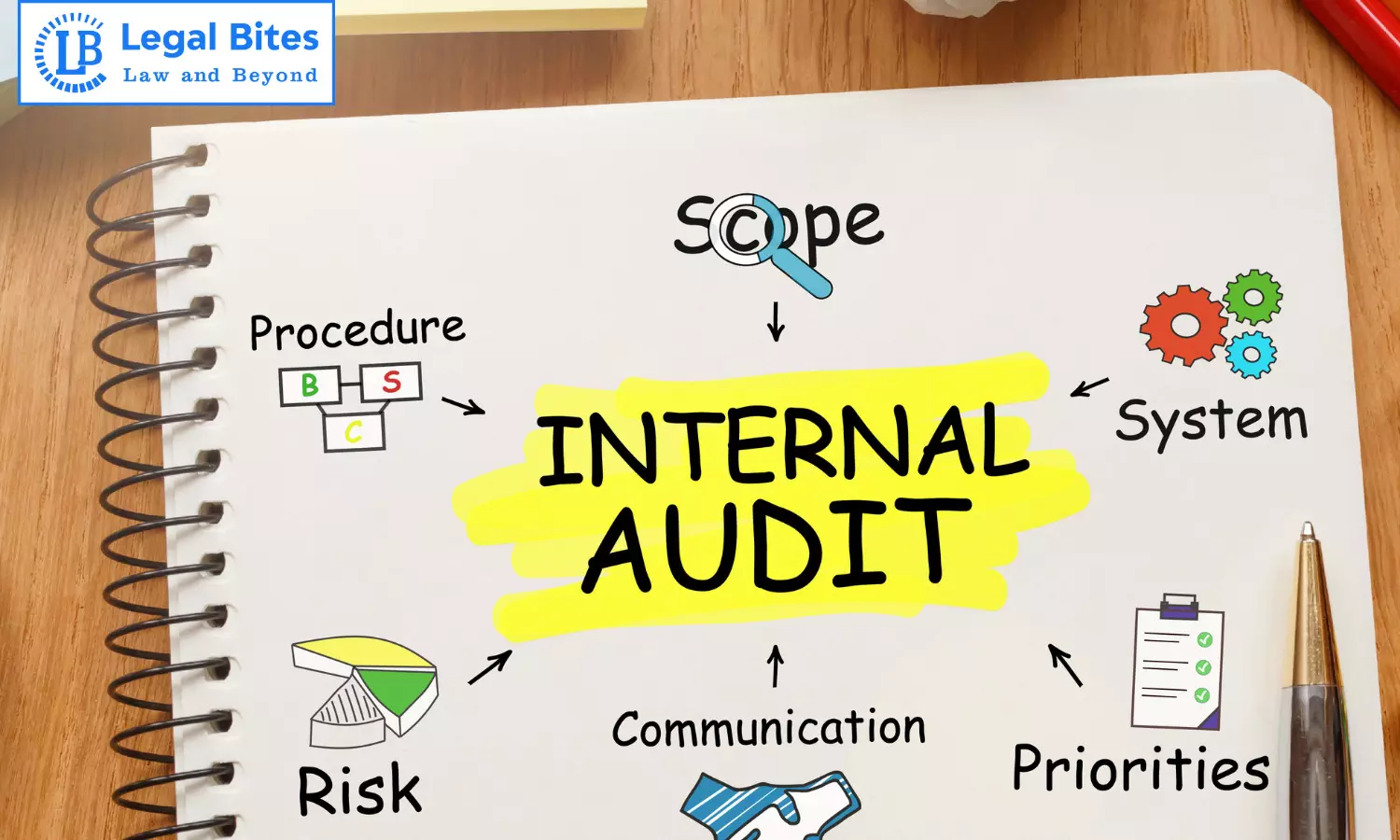Internal Audit under the Companies Act, 2013
The article "internal audit under the Companies Act, 2013" highlights the role of internal audit's in evaluating how well an organization's operational standards are working, its scope, objectives, types and relevant statutory provisions.

The article 'internal audit under the Companies Act, 2013' highlights the role of internal audit's in evaluating how well an organization's operational standards are working, its scope, objectives, types and relevant statutory provisions. An internal audit is a review of an organization's internal controls, procedures, practices, and methodologies. IntroductionIn the present-day scenario, a large number of businesses have grown so big that it's hard to focus on what they're doing. The...
The article 'internal audit under the Companies Act, 2013' highlights the role of internal audit's in evaluating how well an organization's operational standards are working, its scope, objectives, types and relevant statutory provisions. An internal audit is a review of an organization's internal controls, procedures, practices, and methodologies.
Introduction
In the present-day scenario, a large number of businesses have grown so big that it's hard to focus on what they're doing. The risks related to doing business have multiplied along with business expansion. The Government has improved the internal audit system for many companies under the 2013 Companies Act in order to lower the risk associated with the business. Internal audits are crucial to the day-to-day operations of a business. In order to provide independent assurance regarding the efficiency of internal controls and risk management systems and to enable the organisation to achieve its objectives, internal audits evaluate business processes and internal controls.
Internal Audit
Internal audit is an independent management function that continuously and critically evaluates how an entity operates with the aim of providing suggestions for changes, adding value to the overall governance mechanism, and strengthening it.
Some people might think internal audits are less beneficial than external audits. After all, any company may hand-pick internal auditors that are not completely independent from the business. However, there are additional ways internal audits benefit the business and external parties:
Internal audits could help businesses save money: The length of the external audit process and the amount of time spent assisting external auditors may be reduced if a company has robust internal controls.
A company can improve the control environment: Employee adherence to the corporate policy may be encouraged even if the internal audit produces no results because staff members may be aware that their work is evaluated and reported on.
Internal audits could increase business productivity: External audits frequently only check the accuracy of procedures rather than trying to improve them. This distinction is crucial since a business may be "just scraping by" with ineffective procedures that only fulfil the barest necessities.
Internal Audit entails assessing the internal policies, procedures, practices, and methodologies of a company: An internal audit's goal is to evaluate how well an organization's operational standards are functioning. It is either carried out by an organization's employee or a specialist who has been appointed by the board of directors.
Internal Controls
Internal controls are the mechanisms, guidelines, and practices that a business uses to guarantee the accuracy of its financial and accounting data. Internal controls are systematic measures put in place by an organisation to:
- Conduct its operations in a systematic and effective way,
- Protect its resources and assets
- Prevent and identify mistakes, fraud, and theft.
- Ensure the accuracy and completeness of its accounting data
- Generate trustworthy and timely financial and management information
- Guarantee adherence to its plans and policies.
Appointment of Internal Auditors
A specific class of companies must, in accordance with Section 138 of the Companies Act, appoint an internal auditor to undertake internal audits that assess the functioning and operations of the company. In order to analyze the management control system, an internal auditor must be qualified.
As per Section 138(1) of the Companies Act 2013, the following class of companies shall have to mandatorily appoint an internal auditor:
1) Every Listed Company
2) Every Unlisted Public Company if, during the preceding financial year, it satisfies any of the below-mentioned conditions:
- Turnover of rupees two hundred crores or more.
- Paid up share capital of rupees fifty crores or more.
- Outstanding loans or borrowings from banks or PFI exceeding rupees one hundred crores or more at any point in time.
- Outstanding deposits of rupees twenty-five crore or more at any point in time.
Who can be an internal auditor?
It is prescribed that the Internal Auditor shall either be a Chartered Accountant, Cost Accountant, or such other professional as may be decided by the Board. Such Internal Auditor may or may not be an employee of the company which is being audited.
Scope of Internal Audit
The scope, operation, duration, and technique for conducting the internal audit must be determined by the Audit Committee or the Board in consultation with the internal auditor.
An internal auditor needs to have a foundational understanding of the technology and business procedures used by the firm so that he can assess the effectiveness of the operational controls and non-monetary operational performance. He should be acquainted with ERP systems, cost accounting, legislation, taxes, and economics, and shall be proficient with the basic principles and management techniques. He shall also keep the confidentiality of any information he obtained while conducting the audit after the appointment.
Objectives of Internal Audit
The objectives of the Internal Audit are as follows:
- To establish better policies and procedures.
- To assess and enhance the governance, internal control, and risk management systems
- To guarantee greater adherence to the legislation
- To prevent any unnecessary legal action
- Detection of fraud
- Accountability and Integrity
- To uphold shareholders' interests
Other Relevant Sections
Apart from Section 138 of the Companies Act 2013, there are various other sections related to internal audits such as:
Section 144: It states that the statutory auditor shall not provide internal audit services to the company, its holding or subsidiary company. (directly or indirectly)
Section 177(4)(vii): It states that the Audit Committee should evaluate the internal financial control and risk management systems and may discuss the related issue with the internal and statutory auditors
Section 179(3) & 117(3): It talks about the appointment of internal auditors by the BOD and filing of Form MGT – 14 with ROC. However, it is not applicable to Private Limited Companies.
SEBI (LODR) Regulations 2015
Roles of the Audit Committee under the Securities and Exchange Board of India (Listing Obligations and Disclosure Requirements) Regulations, 2015 have also been discussed. It prescribes that:
- The head of internal audit, a representative of the statutory auditor, the finance director or head of the finance function, and any other such executives may be invited by the audit committee to attend committee meetings at their discretion.
- The audit committee shall keep a check on internal auditors' evaluation of any internal investigations' findings into situations where there is suspected fraud, irregularity, or a material breach of internal control systems, and report those findings to the board;
- The audit committee will analyze internal audit reports that discuss internal control problems as well as the hiring, firing, and compensation arrangements for the chief internal auditor.
- The audit committee will assess the effectiveness of any internal audit function, including the department's structure, staffing, and seniority of the official in charge, reporting structure, scope, and frequency, as well as the discussion of any significant findings with internal auditors and any subsequent follow-up.
- The audit committee will review the internal audit reports relating to internal control weaknesses and the appointment, removal and terms of remuneration of the chief internal auditor shall be subject to review by the audit committee.
Types of Internal Audit
The Internal Audit inhabits various other types of internal audits such as:
- Financial Audit
- Operational Audit – Unit / Department
- Management Audit
- Compliance Audit
- IT / System Audit
- Investigation Audit
- Social Audit
- ISO Audit
- Internal Audit of Bank, Stock Broker, DP, NBFC, Insurance Companies etc.
Content of Internal Audit Report
Internal audit reporting often consists of a formal report and an interim report in the form of a memo. A standard interim report contains sensitive or important findings that the auditor believes the board of directors should be made aware of immediately. The audit findings, a description of the procedures and methods utilized to complete the audit, and recommendations for strengthening internal controls and control procedures are all included in the final report.
The Content of the Internal Audit Report includes:
- Title
- Addressee
- Period of coverage of the Report
- Opening or introductory paragraph
- Objective Paragraph
- Scope paragraph
- Documents / Records checked during the IA
- Executive summary, highlighting the key material issues, observations, control, weaknesses and exceptions
- Significant observations, findings and recommendations
- Management comments on respective observations, findings and recommendations
- Action Taken Report
- Date of Report
- Place of signature
- Internal Auditor's signature with Membership No.
Conclusion
Timely adherence to the law and regulations is ensured by an internal audit. It adds a layer of protection and helps control risk brought on by fraud, abuse of authority, or other situations. An unbiased evaluation of the procedures and financial statements is given to management by an internal auditor. An organisation can enhance its operational and financial performance by hiring an internal auditor. A company can choose its own audit team to examine its operations through the internal audit procedure. The internal audit's scope can frequently be determined by the company. Additionally, the business can often select almost any reason for an internal audit. Internal audits are extremely valuable for enhancing internal operations and advising management of ways the company can improve, even though they are less useful for fulfilling external reporting requirements.
References
[1] Internal Auditing: A Quick Overview, Available Here
[2] Procedure under Companies Act 2013, Available Here
[3] Alicia Tuovila, Internal Audit: What It Is, Different Types, and the 5 Cs, Available Here
[4] Hansraj Jaria, Internal Audit Under the Companies Act 2013, Available Here
[5] CA Anand Singh, Applicability of Internal Audit - Companies Act 2013, Available Here
Important Links

Snehil Sharma
Snehil Sharma is an advocate with an LL.M specializing in Business Law. He is a legal research aficionado and is actively indulged in legal content creation. His forte is researching on contemporary legal issues.

